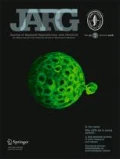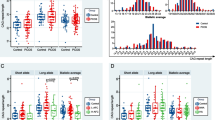Abstract
Purpose
Many studies have been carried out to confirm the relationship between androgen receptor gene CAG repeat polymorphism and polycystic ovary syndrome (PCOS), without consistent results. Hence we conducted the current study to research this relationship.
Methods
224 Chinese Han women with PCOS and 223 in vitro fertilization and embryo transplantation (IVF-ET) infertile women with tubal factor or male infertility served as the controls were recruited in our study. PCR-based assays were applied to genotype the (CAG)n repeat alleles. A meta-analysis including 1,536 PCOS patients and 1,807 controls was conducted to produce a pooled estimate.
Results
We observed that the CAG bi-allelic mean lengths were similar in PCOS patients and controls (22.65 ± 2.5 vs. 23.09 ± 2.1, P = 0.116). When CAG bi-allelic were divided into two categories (mean repeats ≤22, >22), the short AR-CAG bi-allelic showed more frequent in PCOS group than in controls (56.25 % vs 29.14 %, P < 0.001). Further analysis presented that, in PCOS, there was a lower mean CAG repeat lengths in mean bi-allelic lengths (22.3 ± 2.5 vs. 23.9 ± 2.2, P = 0.008) and long bi-allelic lengths (24.3 ± 1.4 vs. 25.9 ± 1.6, P = 0.05) among patients with testosterone less than 0.7 ng/ml compared with those whose testosterone was more than 0.7 ng/ml. Besides, the testosterone were positively correlated with the CAG polymorphism (r = 0.237, P = 0.008), which accorded with our meta-analysis results.
Conclusions
The distribution of AR-CAG allele differed between PCOS patients and controls, and polymorphism of CAG repeat lengths may contribute to hyperandrogenism in PCOS.







Similar content being viewed by others
References
Stein IF, Leventhal ML. Amenorrhea associated with bilateral polycystic ovaries. Am J Obstet Gynecol. 1935;29:181–91.
Azziz R, Woods KS, Reyna R, Key TJ, Knochenhauer ES, Yildiz BO. The prevalence and features of the Polycystic Ovary Syndrome in an unselected population. J Clin Endocrinol Metab. 2004;89(6):2745–9.
Wild RA, Carmina E, Diamanti-Kandarakis E, Dokras A, Escobar-Morreale HF, Futterweit W, et al. Assessment of cardiovascular risk and prevention of cardiovascular disease in women with the polycystic ovary syndrome: a consensus statement by the Androgen Excess and Polycystic Ovary Syndrome (AE-PCOS) Society. J Clin Endocrinol Metab. 2010;95(5):2038–49.
Fux Otta C, Fiol de Cuneo M, Szafryk de Mereshian P. Polycystic ovary syndrome: physiopathology review. Rev Fac Cien Med (Cordoba, Argentina). 2013;70(1):27–30.
Xita N, Georgiou I, Tsatsoulis A. The genetic basis of polycystic ovary syndrome. Eur J Endocrinol. 2002;147(6):717–25.
Simental JA, Sar M, Lane MV, French FS, Wilson EM. Transcriptional activation and nuclear targeting signals of the human androgen receptor. J Biol Chem. 1991;266(1):510–8.
Trapman J, Klaassen P, Kuiper GG, van der Korput JA, Faber PW, van Rooij HC, et al. Cloning, structure and expression of a cDNA encoding the human androgen receptor. Biochem Biophys Res Commun. 1988;153(1):241–8.
Jahaninejad T, Ghasemi N, Kalantar SM, Sheikhha MH, Pashaiefar H. StuI polymorphism on the androgen receptor gene is associated with recurrent spontaneous abortion. J Assist Reprod Genet. 2013;30(3):437–40.
Chamberlain NL, Driver ED, Miesfeld RL. The length and location of CAG trinucleotide repeats in the androgen receptor N-terminal domain affect transactivation function. Nucleic Acids Res. 1994;22(15):3181–6.
Tut TG, Ghadessy FJ, Trifiro MA, Pinsky L, Yong EL. Long polyglutamine tracts in the androgen receptor are associated with reduced trans-activation, impaired sperm production, and male infertility. J Clin Endocrinol Metab. 1997;82(11):3777–82.
Irvine RA, Ma H, Yu MC, Ross RK, Stallcup MR, Coetzee GA. Inhibition of p160-mediated coactivation with increasing androgen receptor polyglutamine length. Hum Mol Genet. 2000;9(2):267–74.
Buchanan G, Yang M, Cheong A, Harris JM, Irvine RA, Lambert PF, et al. Structural and functional consequences of glutamine tract variation in the androgen receptor. Hum Mol Genet. 2004;13(16):1677–92.
Mononen N, Ikonen T, Autio V, Rökman A, Matikainen MP, Tammela TL, et al. Androgen receptor CAG polymorphism and prostate cancer risk. Hum Genet. 2002;111(2):166–71.
Greenland KJ, Beilin J, Castro J, Varghese PN, Zajac JD. Polymorphic CAG repeat length in the androgen receptor gene and association with neurodegeneration in a heterozygous female carrier of Kennedy’s disease. J Neurol. 2004;251(1):35–41.
Giovannucci E, Stampfer MJ, Krithivas K, Brown M, Dahl D, Brufsky A, et al. The CAG repeat within the androgen receptor gene and its relationship to prostate cancer. Proc Natl Acad Sci U S A. 1997;94(7):3320–3.
Hardy DO, Scher HI, Bogenreider T, Sabbatini P, Zhang ZF, Nanus DM, et al. Androgen receptor CAG repeat lengths in prostate cancer: correlation with age of onset. J Clin Endocrinol Metab. 1996;81(12):4400–5.
Cırık DA, Dilbaz B. What do we know about metabolic syndrome in adolescents with PCOS? J Turk Ger Gynecol Assoc. 2014;15(1):49–55.
Carson-Jurica MA, Schrader WT, O’Malley BW. Steroid receptor family: structure and functions. Endocr Rev. 1990;11(2):201–20.
Ibanez L, Ong KK, Mongan N, Jääskeläinen J, Marcos MV, Hughes IA, et al. Androgen receptor gene CAG repeat polymorphism in the development of ovarian hyperandrogenism. J Clin Endocrinol Metab. 2003;88(7):3333–8.
Niki H, Matsuzaki T, Kinouchi R, Iwasa T, Kawami T, Kato T, et al. Improvement in diagnostic performance of the revised total testosterone measuring system in Japanese women with polycystic ovary syndrome. J Med Invest. 2014;61(1.2):65–71.
Yong EL, Loy CJ, Sim KS. Androgen receptor gene and male infertility. Hum Reprod Update. 2003;9(1):1–7.
La Spada AR, Wilson EM, Lubahn DB, Harding AE, Fischbeck KH. Androgen receptor gene mutations in X-linked spinal and bulbar muscular atrophy. Nature. 1991;352(6330):77–9.
Mifsud A, Ramirez S, Yong EL. Androgen receptor gene CAG trinucleotide repeats in anovulatory infertility and polycystic ovaries. J Clin Endocrinol Metab. 2000;85(9):3484–8.
Jääskeläinen J, Korhonen S, Voutilainen R, Hippeläinen M, Heinonen S. Androgen receptor gene CAG length polymorphism in women with polycystic ovary syndrome. Fertil Steril. 2005;83(6):1724–8.
Liu Q, Hong J, Cui B, Zhang Y, Gu W, Chi Z, et al. Androgen receptor gene CAG(n) trinucleotide repeats polymorphism in Chinese women with polycystic ovary syndrome. Endocrine. 2008;33(2):165–70.
Ferk P, Perme MP, Teran N, Gersak K. Androgen receptor gene (CAG)n polymorphism in patients with polycystic ovary syndrome. Fertil Steril. 2008;90(3):860–3.
Kim JJ, Choung SH, Choi YM, Yoon SH, Kim SH, Moon SY. Androgen receptor gene CAG repeat polymorphism in women with polycystic ovary syndrome. Fertil Steril. 2008;90(6):2318–23.
Laisk T, Haller-Kikkatalo K, Laanpere M, Jakovlev U, Peters M, Karro H, et al. Androgen receptor epigenetic variations influence early follicular phase gonadotropin levels. Acta Obstet Gynecol Scand. 2010;89(12):1557–63.
Dasgupta S, Sirisha PV, Neelaveni K, Anuradha K, Reddy AG, Thangaraj K, et al. Androgen receptor CAG repeat polymorphism and epigenetic influence among the south Indian women with Polycystic Ovary Syndrome. PLoS One. 2010;5(8):e12401.
Skrgatic L, Baldani DP, Cerne JZ, Ferk P, Gersak K. CAG repeat polymorphism in androgen receptor gene is not directly associated with polycystic ovary syndrome but influences serum testosterone levels. J Steroid Biochem Mol Biol. 2012;128(3–5):107–12.
Schüring AN, Welp A, Gromoll J, Zitzmann M, Sonntag B, Nieschlag E, et al. Role of the CAG repeat polymorphism of the androgen receptor gene in polycystic ovary syndrome (PCOS). Exp Clin Endocrinol Diabetes. 2012;120(2):73–9.
Rajender S, Carlus SJ, Bansal SK, Negi MP, Sadasivam N, Sadasivam MN, et al. Androgen receptor CAG repeats length polymorphism and the risk of polycystic ovarian syndrome (PCOS). PLoS One. 2013;8(10):e75709.
Shah NA, Antoine HJ, Pall M, Taylor KD, Azziz R, Goodarzi MO. Association of androgen receptor CAG repeat polymorphism and polycystic ovary syndrome. J Clin Endocrinol Metab. 2008;93(5):1939–45.
Rotterdam ESHRE/ASRM-Sponsored PCOS Consensus Workshop Group. Revised 2003 consensus on diagnostic criteria and long-term health risks related to polycystic ovary syndrome. Fertil Steril. 2004;81(1):19–25.
Xia Y, Che Y, Zhang X, Zhang C, Cao Y, Wang W, et al. Polymorphic CAG repeat in the androgen receptor gene in polycystic ovary syndrome patients. Mol Med Rep. 2012;5(5):1330–4.
Zhang T, Liang W, Fang M, Yu J, Ni Y, Li Z. Association of the CAG repeat polymorphisms in androgen receptor gene with polycystic ovary syndrome: a systemic review and meta-analysis. Gene. 2013;524(2):161–7.
Wang R, Goodarzi MO, Xiong T, Wang D, Azziz R, Zhang H. Negative association between androgen receptor gene CAG repeat polymorphism and polycystic ovary syndrome? A systematic review and meta-analysis. Mol Hum Reprod. 2012;18(10):498–509.
Van Nieuwerburgh F, Stoop D, Cabri P, Dhont M, Deforce D, De Sutter P. Shorter CAG repeats in the androgen receptor gene may enhance hyperandrogenicity in polycystic ovary syndrome. Gynecol Endocrinol. 2008;24(12):669–73.
Acknowledgments
We are grateful to the subjects participating in this study. This work was partially supported by grants from the no. National Natural Science Foundation of China (No.31371277; No.81102516) and the Science and Technology Research Program of Hunan Province of China (2012FJ4296).
Conflict of interest
The authors declare that they have no conflict of interest.
Author information
Authors and Affiliations
Corresponding author
Additional information
Capsule Androgen receptor gene CAG polymorphism research and meta-analysis suggested that CAG polymorphism was not associated with polycystic ovary syndrome. But CAG polymorphism was responsible for hyperandrogenism in PCOS.
Cui Ying Peng, Hui Jun Xie and Zi Fen Guo contributed equally to this study.
Rights and permissions
About this article
Cite this article
Peng, C.Y., Xie, H.J., Guo, Z.F. et al. The association between androgen receptor gene CAG polymorphism and polycystic ovary syndrome: a case-control study and meta-analysis. J Assist Reprod Genet 31, 1211–1219 (2014). https://doi.org/10.1007/s10815-014-0286-0
Received:
Accepted:
Published:
Issue Date:
DOI: https://doi.org/10.1007/s10815-014-0286-0




